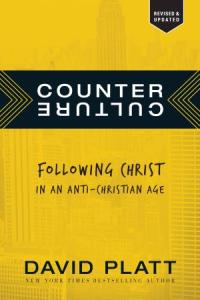Disclaimer: It is not my usual policy to provide book reviews. In this case perhaps we could consider it more of a testimonial.
I recently read and immediately re-read a book that has now been on my mind for a few months. This book was so challenging I had to put it down multiple times, take a few deep breaths, and gather my energy to press forward. I cried at several points. I stopped to pray almost every chapter. The book I am referring to is David Platt’s Counter Culture: Following Christ in an Anti-Christian Age.
David Platt came to the forefront of Christianity in America in 2010 with the publication of his first book, Radical. I read this book when it came out, but it did not have the impact on me that his newest release has had. Perhaps this is the result of a few more years of life, having raised my kids, having experienced the death of my wife’s father, knowing first-hand war and loss in Iraq and Afghanistan; probably just some combination of them all. I know I am not the same person who read Radical almost 13 years ago, and now at 46 I think I appreciate with better clarity the gravity of the subject matter in Counter Culture.
Gracious words, Tough topics
Throughout Platt is direct but gracious, inviting discussion and emotion over the topics he presents. He is fair and open, honest about his own life experiences, and he brings the reader along with him as he explores the responsibility of the believer in the world today. His tone is determined but merciful, straight to the heart and allowing no room for excuses.
The reader can see the ride they are in for with this book with a simple glance at the table of contents. It reads like a laundry list of the most difficult topics to discuss, topics which force the reader to ask themselves this question: “Am I serving God the way I should in this area?” That is all the author asks is for the reader to risk his or her personal feelings for a moment to engage with issues of great importance.
Platt opens with this statement:
The gospel is the lifeblood of Christianity, and it provides the foundation for countering culture. For when we truly believe the gospel, we begin to realize that the gospel not only compels Christians to confront social issues in the culture around us. The gospel actually creates confrontation with the culture around – and within – us.
Counter Culture, 1 (emphases original)
But Won’t I Seem Intolerant if I “Counter Culture?”
He also opens by addressing the fears which many Christians have with difficult topics, fears of appearing intolerant, fears that we appear out of touch by defending an ancient book of beliefs, fears that we may lose friends by taking a stance on social issues which goes against the expectations of our society. These fears are very real and keep Christians, especially in the West, from holding biblical positions on social topics (at least in public). These fears also keep up from presenting the gospel when the easier way out is to say nothing.
Platt implores his readers to look at themselves in a critical way, and to avoid our human nature which tell us to hide from difficult conversations. He identifies with his reader when he says:
I see a tendency in me, my family, and my church to prioritize my comforts over Christ’s commands and to elevate my thoughts over his truth, and I know that retreat isn’t right.
Platt, Counter Culture, xiv
Back to that Table of Contents. Here is where the reader confronts Platt’s heart and his message. These chapters have titles such as:
- “Where Rich and Poor Collide: the Gospel and poverty”
- “Modern Holocaust: The Gospel and abortion”
- “A war on Women: The Gospel and sex slavery”
These topics are unavoidably difficult, fraught with tension and with discord. Each us reading those can only imagine the cringes and avoidance if we were to bring up these topics at a dinner party with friends. This feeling however is what Platt intends and begs his readers to lean into. Without addressing sin and worldwide issues such as these we as believers may feel as sense of relief, but that relief comes at the expense of giving up on the gospel. If we believe Christ came to save the whole world, and we refuse to engage in the tough causes and conversations, we have abandoned our responsibility.
Counter Culture: A Book for Tears
The first point at which I had to set the book down and cry a few tears before moving on came in Chapter Two: Where Rich and Poor Collide. Here Platt minces no words when he speaks to the responsibility especially for Christians in the West to use our resources to help those in need. It is a fact that the global South comprises about two-thirds of the population of the world, the vast majority of whom live in poverty.
He never tells his readers to abandon care for the poor in their own communities. He merely points out that the median income in America places those households in the wealthiest 3% of people in the world. This statistic should be shocking to Americans and force us to reevaluate how we live. He never shames his readers or implies that we should feel guilty for our affluence, only that we should acknowledge it.
Platt states:
If the love of God is in our hearts, then it is not possible for us to ignore the poor in the world. The gospel compels Christians in a wealthy culture to action – selfless, sacrificial, costly, countercultural action – on behalf of the poor. For if we don’t act in this way, then it may become clear that we were never Christians in the first place.
Counter Culture, P. 29
I literally changed my tithing practices based on this one sentence.
Our Christian Responsibility in Culture
Another example of the personal nature of this book came for me in his discussion of orphans and widows. Jas 1.27 states:
Religion that is pure and undefiled before God, the Father, is this: to visit orphans and widows in their affliction, and to keep oneself unstained by the world.” Referencing this verse he says: “What an astounding statement. This is God’s definition of pure religion: ‘to visit orphans and widows in their affliction.’ True religion apparently doesn’t consist of monotonous participation in superficial pious activity. True religion consists of just and consistent demonstrations of supernature, selfless love.
Sometimes this selfless love comes home for us. In 2021 my wife’s father passed away from COVID. This left my wife’s mother with no one to care for her. She was 70 years old and had been married for 50 years. She had never had to care for herself and was lost. My wife and I agreed that my mother-in-law should come live with us and this has been an incredibly difficult transition. She still lives with us and it requires sacrifice on all our parts every day. However, this is the care we may feel is our requirement in order to meet God’s expectations in the book of James.

Worldwide slavery today
Finally, there is Chapter Five: “The Gospel and sex slavery.” Approximately 40 million people live in various kinds of slavery in the world today, about half of whom are women who are in some form of sex slavery (this includes forced marriages) . It is shocking to most Americans and people in the West to be confronted with these facts. That slavery exists in the world is so far from our day-to-day lives that we can hardly comprehend the extent of this injustice throughout the world. It is frankly a bit shocking.
David Platt identifies with his readers when he says he really never considered modern day slavery. It seems like a relic of a dark and bygone era. He then pulls no punches when he reminds the reader of their responsibility. He says: “Slavery still exists. And now that I know it does, I have no choice but to do something about it. Further, now that you know it does, you have no choice but to do something about it.”
For me personally I have not decided what my family and I are going to do about worldwide slavery. There are numerous avenues which the reader can pursue, some Christian and some secular but all focused on this worldwide travesty. Here is a link for seven Christian groups who operate with this mission. 7 Christian Groups Working to End Human Trafficking | Newsmax.com Choose one or more but do something.
Don’t Just Read Counter Culture
This is the tone of Platt’s book throughout. It is the responsibility of the believer to make choices with our time, money, and resources that have true impact on the world today. Our adherence to the Gospel compels each of us to give up the sidelines and get in the fight. Read Counter Culture and then reevaluate your life. God will you show you what He desires you to do. But beware, whatever choices you make come with sacrifice. It will not be easy as you acknowledge and wrestle with these painful issues. However, your obedience to Christ requires the sacrifice. Join me and many others as believers in the West committed to changing our lifestyles in order to go counter to our culture and sacrifice even ourselves.













